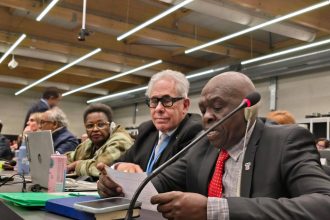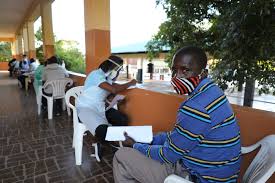New research presented at the World Conference on Lung Health (WCLH), hosted by the International Union Against Tuberculosis and Lung Disease (The Union), has spotlighted the unique burden of tuberculosis (TB) and other lung diseases on refugee and migrant populations – as well as the solutions needed to address these.
People from refugee and migrant backgrounds represent a vulnerable population, often facing additional risks and barriers to care. This can include limited access to healthcare, disrupted treatment regimens, and overcrowded living situations.
Presentations at the Conference underscored the need for effective screening strategies tailored to these communities, emphasising early detection, prevention, and cross-cultural and language barrier awareness.
Research presented at the Conference from Medecins Sans Frontières (MSF) examined the unique burden of TB and drug-resistant TB facing refugees fleeing to Poland from the war in Ukraine, representing around 1.5 million people.
MSF identified several unique barriers facing Ukrainian refugees in Poland, including low accessibility and acceptability of TB care, late diagnosis and treatment, and a heightened risk of drug resistance.
In the face of these challenges, MSF have led a project since 2022 to provide greater support to Ukrainian refugees in Poland. These included donation of medicines, facilitated connections to TB care (e.g. an Infoline; organisation of referrals and admissions), social, administrative and legal support for patients, advocacy, and capacity building.
“In addition to providing much needed support refugees from Ukraine and other migrants to access and adhere to TB treatment, Medecins Sans Frontières’ advocacy helped secure essential TB medicines across Poland and the EU and drove the adoption of patient-centred, ambulatory care for drug-resistant TB,” said Joanna Ladomirska.
In high-income countries, where the burden of TB is low, migrant populations are often the most-affected. Research from the KNCV Tuberculosis Foundation, presented at the Conference, noted that 80% of all TB patients in the Netherlands were born abroad. These patients were found by KNCV to face language barriers and stigma, representing an additional barrier to care.
Researchers from KNCV trialled an AI-enabled ‘TB Knowledge Chatbot’, designed to improve knowledge of TB and the screening and diagnostic services available. During a pilot phase, in which the Chatbot was deployed via WhatsApp and web browser, users found the tool to be realistic, engaging, and provided useful and appropriate information.
“At KNCV, we know language barriers can delay care. Many people simply don’t know where to turn for information. With our TB Knowledge Chatbot, available on WhatsApp and Telegram, people especially from migrant communities, can access clear, reliable TB information in their own language, free of charge. This innovation offers a simple solution that removes a major barrier to seeking health information,” said Job van Rest, Digital Health Solutions at KNCV.
“It is important that we recognize the unique challenges of refugees, because if we fail to do that, we risk underestimating their high tuberculosis prevalence and missing the opportunities we have to screen.” said Christian Wejse, Head of Clinic for Complex and Cross-Cultural Medicine at Aarhus University. “We have in most European countries and – most certainly in Denmark – missed this opportunity for the large population of Ukrainian refugees, and this may lead to an increased spread of tuberculosis and the risk of Multi-Drug-Resistant tuberculosis. To avoid this, we should screen refugees much more diligently.”
According to Tenzin Kunor, Global Policy Senior Associate at RESULTS, a human rights paradigm begins with the fundamental belief that everyone regardless of their circumstances should have access to high quality healthcare. Health is a human right.
Kunor added that the challenges regarding TB among migrant and refugee populations require interconnected solutions with cooperation, collaboration, and coordination – all with human rights at the center of the work.
On his part, Prof Guy Marks, President of the Union noted that refugee and migrant communities represent some of the most vulnerable populations, and face a unique burden of TB. Not only from the disease itself, but from greater barriers to diagnosis, care and support.
“Even in countries where TB is a rare disease, there is no excuse for a lack of adequate support systems. Breaking the chain of transmission requires access to screening, diagnosis and treatment for everyone living with TB – and we must ensure this access is extended to refugee and migrant communities as well,” said Guy.




